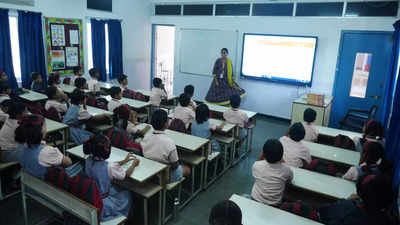The Central Board of Secondary Education (CBSE) has introduced significant changes in the syllabus for the 2025-26 academic session, aiming to create a more dynamic and future-ready learning environment. The updated curriculum, now accessible to all affiliated schools, provides a structured roadmap for academic instruction from Classes IX to XII. It details subject syllabi, examination frameworks, learning outcomes, and pedagogical strategies designed to enhance student engagement and comprehension.
Schools to align with strategic guidelines
CBSE has directed schools to strictly adhere to the guidelines outlined in the curriculum document. Educational institutions are expected to implement innovative teaching methodologies while following the prescribed syllabus. The board has emphasized experiential learning, competency-based assessments, and interdisciplinary teaching techniques to enhance students’ analytical and problem-solving abilities, equipping them for real-world challenges.
Modern teaching approaches to redefine learning
With an evolving educational landscape, CBSE is encouraging schools to adopt student-centric teaching methodologies in line with the National Curriculum Framework-2023 (NCF-2023). Key instructional strategies include:
- Project-based learning: Engaging students in hands-on problem-solving activities that mirror real-life scenarios.
- Inquiry-driven education: Stimulating curiosity by prompting students to explore, question, and analyze concepts from multiple perspectives.
Technology-integrated learning : Utilizing AI-driven tools, digital platforms, and e-learning resources to improve engagement and accessibility.
- Collaborative lesson planning: Encouraging teachers to refine strategies dynamically to address evolving educational needs.
Revamped assessment model: Moving beyond rote learning
CBSE has also overhauled its assessment structure to emphasize competency-based evaluations over rote memorization. Schools are encouraged to design assessments that test critical thinking and analytical skills, ensuring students develop a deeper understanding of concepts. The new approach aims to bridge the gap between theoretical knowledge and practical application, better preparing students for higher education and professional careers.
Students and teachers can check the official notification regarding the change in the syllabus here.











